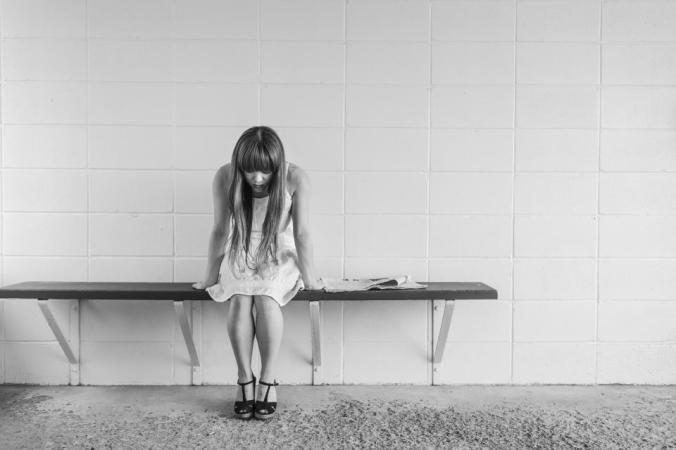
…so here we stand arms upstretched come day or night or rain or snow or sun. unnoticed, us, full of beauty and life coursing through but on you go past us without glancing upwards. guarding night and day arms up to heavens unchanging and strong we do not yield to rain or wind except the fiercest storms when crack and splinter dark bark rent apart and unseen flesh and sap exposed. leaves and twigs on branch and furrowed scaly bark rough protection yet protection none when you come with axe or saw, though all my being strains to live I am powerless and cannot run but only stand and scream. all through night in dark and starry skies my arms still upstretched untiring against the moon while on you sleep uncaring and unknowing, unaware of strength and beauty and peace and wisdom outside your house and on your street and in your garden. your mind on petty everyday affairs your job your boss your sex life your new car your holidays and not a thought for oxygen and lungs and our breathing life for you our planet with green growth and shelter and food. but we breathe on through years decades centuries millennium outliving all mankind watching kings and queens and leaders presidents dictators generals armies rise and fall we live through all endure endure persist give life give breath heal each other. little you care of animals insects creatures so plants and trees still less, forests and jungles disappearing, breath choked out, gasping, wheezing un-lunged continents. my own part just to stand here on your corner, street corner, houses around cars passing by fumes choking but changing with seasons adding to your life if still unnoticed guarding street sentinel until you see me in the way and come to lop chop machete axe me down limbs severed butchered fall to ground and cleared away not even used as boat or chair or fuel just abandoned tipped landfilled lost and I scream and my brothers cry with me but still on we stand arms upstretched uncomplaining and changing yet unchanging wishing you well and saving you and unthanked we breathe on ..
Laurie had just sat down at her desk with a coffee and turned on the pc when she heard the truck pull up in the street outside her house. She looked up automatically and through the window saw two guys jumping out of the cab. Then she read the writing on the side of the truck,
Greenwood’s Tree Surgeons
She watched them lift a chainsaw each out of the back of the truck and advance on the two alder trees on the corner.
Stay calm, she instructed herself. They’re probably here to do a bit of maintenance work. But she abandoned her desk and coffee and hurried out down the driveway to speak to them.
“Good morning guys, what’s happening?” she said, smiling. “And can I make you both a cup of tea?”
The younger man glanced to his boss, who answered,
“Thank you kindly. Don’t mind if we do. But then it’ll be best if you keep clear, as we’re here to cut these trees down.”
Laurie gulped,
“Cut them down? Not just prune them?”
The man repeated,
“Cut them down. Council’s orders.”
Laurie felt herself go hot and cold all over and realised this called for reinforcements. She took off up the drive and back into the house, shouting back over her shoulder to lull them into a false sense of security,
“I’ll be right back with your teas…and some biscuits…”
She grabbed her mobile and called Bernadette, local busybody and head of the street’s elderly Neighbourhood Watch,
“Bernie, did you know anything about the council cutting down the alder trees outside my house?
……………………
“No, me neither. Well, there’s a couple of guys here now with their chainsaws.”
……………………
“Yes, yes, great idea. Bring as many as you can, and definitely Henry. I think I can stall them for ten minutes with tea. But hurry!”
Laurie rang off and set about making the promised drinks, dashing back to check through the window every couple of minutes that the men hadn’t started work. Fortunately, like most workmen employed by the council, they seemed happy enough to have a tea break before getting anything done.
Twenty minutes later the two workmen, whom Laurie had discovered were called Bob and Pete, were munching their way through a plate of chocolate digestives and swilling back industrial size mugs of tea. Laurie had heard from Bob about Bob’s wife and Pete’s pregnant girlfriend, Bob’s now grown-up children, said children’s ground-breaking university educations, (with a quick detour round his own uneducated parents’ hard life), his musically talented grandkids, his planned holiday in Tenerife, his vegetable allotment and his general outlook on the Tory government. Pete meanwhile gazed up at the trees and munched away. No doubt thinking about his imminent fatherhood, thought Laurie.
Just as Bob took his last gulp of tea and set down his mug on the pavement, Laurie saw a small but bristling crowd turn into the end of the street. Bob followed her glance,
“Hey up,” he said. “What’s all this then?”
Laurie was relieved to see Bernadette at the helm, flanked by Henry and his wife Jean, with Susan, Beryl, James and a couple of others she didn’t know bringing up the rear. Laurie could almost see their metaphorical pitchforks being brandished in the air, and she was not alone.
“Quick, lad, back in the cab,” Bob told Pete, and then shook his head at Laurie as he climbed back in behind the wheel, “I thought you were being overly friendly. Stalling tactics was it? Typical.”
Laurie reddened but said in her defence,
“I always offer workmen a drink. We just don’t want you to cut our trees down.”
The two men were safely back in their truck by the time a breathless Bernadette and her posse reached them.
“Well done Laurie,” she slapped Laurie on the back. “So lucky you spotted them.”
There was a general murmur of assent and Henry, a retired solicitor, advanced on the truck’s cab and gestured to Bob that he should wind his window down. Bob hesitated and then valour overtook discretion and he complied.
“Good morning gentlemen,” Henry was politeness personified.”Will you tell me what you’re here for this morning, please?”
Bob reached inside his coat and Laurie wondered for a mad moment if he was going to pull out a weapon, but then, no…this was rural Thorpshire after all…he produced a folded bit of paper which he handed to Henry.
Henry studied it,
“What’s it say, what’s it say?” said Jean at his elbow.
Henry paused theatrically, adjusting his spectacles, then read from the letter,
“To Whom It May Concern. By order of Mablethorpe County Council, these trees are to be felled. On the advice of council arboreal experts…blah blah blah…inherent risk involved with retaining trees of this size in such close proximity to properties.
There have been a number of complaints recently…blah blah blah…. falling debris, damage to the carriageway, footpath and vehicles.
The trees are likely to become bigger and require more regular maintenance. They also have the potential to cause damage to property …blah blah blah….which is a significant likelihood due to the lack of adjacent screening to protect them from wind and the elements.
We believe the best option for the long-term maintenance of the area is to remove the two trees and re-plant with a more appropriate species for the area, ideally one with a smaller ultimate height.”
Henry folded the letter, slipped his specs back in their case and waited for a reaction.
There was a collective gasp from the neighbourhood watch brigade.
Beryl started crying,
“But these trees have been here nearly fifty years – they were planted when the estate was built.”
“How could anyone want to cut them down?” asked Susan. “They’re beautiful – and they have as much right to be here as we do.”
“A smaller ultimate height?” snorted Bernadette. “A shrub more like. Not on my watch!”
Returning the letter to Bob, Henry told him,
“There should, by law, have been a consultation period with residents.”
“Look, I don’t know anything about that, mate,” Bob said. “I’m just here to do a job.”
“Well, I’m afraid you won’t be cutting these trees down today,” said Henry, and with that he turned away from the truck and led his band over to the alder trees, where the residents joined hands and formed a circle around them. A couple of women started to sing,
“We shall not, we shall not be moved”
And although Laurie was one hundred percent behind the cause, she decided that this was a good time to go make another round of teas for everyone – including Bob and Pete, of course. Pete had his feet up on the dashboard now and was reading a newspaper, and Laurie was sure she overheard Bob on his mobile telling his council boss about a group of violent vigilantes preventing them from working.
The neighbourhood watch/vigilante party were just getting into their stride when Bob jumped out of his cab and addressed them,
“You win folks. Well, for today at least. We’ve been told to get off to our next job.”
A small cheer went up.
“I wouldn’t get too excited though. Mr Bryant at the council says he’ll be writing to residents and the work will be rescheduled within the next few weeks.”
“Not if we’ve got anything to do with it!” said Bernie, and Laurie could see her formulating plans for residents’ meetings, flyers, petitions on the high street, a sit in…Bernie would be in her element.
“Thanks for the teas, love,” Bob handed her their mugs back. “Sorry if I was a bit harsh earlier. We get a lot of abuse in this job. Nice old crowd you’ve got here, though. See you again soon, no doubt.”
Laurie thanked him and collected all the mugs in. She had a feeling she was going to be very busy over the next few weeks.
She looked over at the trees and smiled. They didn’t know how loved they were or what a narrow escape they’d had.
Oblivious.
…so here we stand arms upstretched come day or night or rain or snow or sun. noticed, us, full of beauty and life coursing through and on you go past us looking upwards. guarding night and day arms up to heavens unchanging and strong we do not yield to rain or wind except the fiercest storms when crack and splinter dark bark rent apart and unseen flesh and sap exposed. leaves and twigs on branch and furrowed scaly bark rough protection yet protection none when they come with axe or saw, though all my being strains to live I am powerless and cannot run but only stand and scream. and here you come caring and aware knowing our strength and beauty and peace and wisdom outside your house and on your street and in your garden. your mind on oxygen and lungs and our breathing life for you our planet with green growth and shelter and food. we breathe on through years decades centuries millennium outliving all mankind watching kings and queens and leaders presidents dictators generals armies rise and fall we live through all endure endure persist give life give breath heal each other. you care for animals insects creatures and plants and trees, forests and jungles lunged continents. my own part just to stand here on your corner, street corner, houses around cars passing by fumes choking but changing with seasons adding to your life noticed now guarding street sentinel until they see me in the way and come to lop chop machete axe me down limbs to sever butcher fall to ground and clear away and I scream and my brothers cry with me and you come save us help us brothers so still we stand arms upstretched uncomplaining and changing yet unchanging wishing you well and saving you and saving us we endure persist breathe with thanks breathe on...








